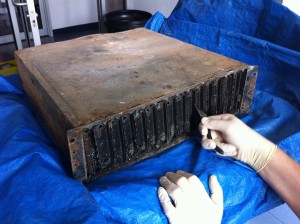
A data recovery engineer removing a hard drive from a fire-damaged RAID.
Data recovery specialists are engineers who repair hard drives, solid-state drives (SSDs), flash media, RAID (Redundant Array of Independent Disks) systems, and other storage devices with the goal of restoring stored data to a usable condition.
They’re also referred to as data recovery engineers and data recovery technicians. At Datarecovery.com, we prefer “engineers;” our employees use engineering best practices when researching and developing data loss scenarios, and many have computer engineering degrees.
In this article, we’ll address some commonly asked questions about data recovery professionals. To learn more about our services, call 1-800-237-4200 or get started with a risk-free media evaluation.
What education is necessary for data recovery specialists?
Data recovery specialists typically have a bachelor’s degree in computer science, information technology, computer engineering, or a related field. Some employers may also require candidates to have experience working in a data center or other IT environment.
With that said, there is no widely recognized accreditation for data recovery professionals. Essentially, if you’re able to perform the job, you can claim the title — and if you specialize in a certain type of data recovery (for example, database recovery or hard drive data recovery), all the better.
But major data recovery providers (including Datarecovery.com) expect their engineers to have several years of experience, at minimum, with storage media hardware and disaster recovery. Additional on-the-job training is provided.
What tools do data recovery specialists use?
The exact tools used on a specific data recovery case will vary depending on the type of storage media, the extent of media damage, and other factors.
However, all professional data recovery laboratories should be outfitted with appropriate technologies, including:
- Certified cleanrooms. Cleanrooms prevent contamination (and potential media damage) during physical repairs. Learn more about the importance of data recovery cleanrooms.
- Firmware repair tools. Hard drives and SSDs usually have drive-specific firmware, which may need to be adjusted or repaired during the data recovery process. Learn about how firmware repair tools impact data recovery success rates.
- An extensive media library. Physical repairs require donor parts, and if those parts aren’t onsite, they’ll need to be ordered — which can cause lengthy delays. Datarecovery.com’s parts library contains thousands of donor hard drives, carefully organized and logged for quick access. Take a look inside our parts inventory.
Are data recovery specialists capable of performing computer forensics and e-discovery?
Not necessarily, although there’s significant overlap between the fields. The goal of data recovery is to restore files to a working state.
The goal of computer forensics is to preserve, collect, and analyze digital evidence in a way that is legally admissible and can be used to reconstruct past events or identify individuals responsible for criminal activity.
To specialize in computer forensics, specialists need years of experience with electronic discovery (e-discovery) software and a solid understanding of legal principles. They must be prepared to present evidence in a court of law.
Read about computer forensic services from Datarecovery.com.
What’s the job outlook for data recovery specialists?
Excellent. While hard drives are becoming less popular for consumer storage — and cloud services have limited data loss for the vast majority of consumers — the global need for data storage continues to expand.
In the future, we expect specialization to become more important for data recovery professionals. Engineers who have decades of experience with cloud systems, for example, will be in high demand. And while consumer-focused data recovery services will become less common, they’ll still be widely available; data loss impacts everyone, and reliable solutions will continue to serve a crucial purpose.
Datarecovery.com maintains full-service laboratories at every location. We provide dedicated solutions for all data loss scenarios, from hard drive failures to ransomware attacks. To learn more about our services, call 1-800-237-4200.





